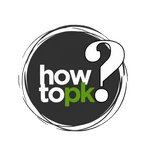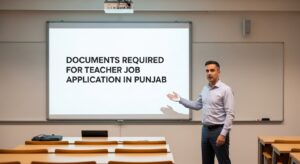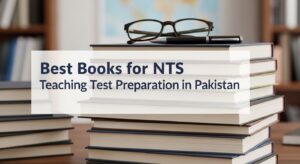Are you preparing for the educators test in Pakistan and feeling overwhelmed by the pedagogy section? You’re not alone. Pedagogy MCQs represents one of the most challenging components of teacher certification exams, requiring both theoretical knowledge and practical application skills.
This comprehensive guide will transform your preparation approach, providing you with battle-tested strategies that have helped thousands of Pakistani educators succeed in their certification journey.
Understanding the Pedagogy MCQs Pakistan Landscape
Before diving into preparation strategies, it’s crucial to understand what you’re facing. Pedagogy MCQs in educator tests typically cover:
- Child development and psychology
- Learning theories and educational philosophies
- Classroom management techniques
- Assessment and evaluation methods
- Teaching methodologies and approaches
- Educational technology integration
- Inclusive education practices
The National Testing Service (NTS) and provincial testing bodies design these questions to assess your understanding of educational principles and their practical applications in Pakistani classroom contexts.
Strategy 1: Build a Solid Foundation in Educational Theory
Core Areas to Master
Learning Theories: Understanding how students learn forms the backbone of effective pedagogy. Focus on:
- Behaviorism (Pavlov, Skinner): How conditioning shapes learning
- Cognitivism (Piaget, Vygotsky): Mental processes in learning
- Constructivism (Dewey, Bruner): Students building their own knowledge
- Social Learning Theory (Bandura): Learning through observation and modeling
Practical Application Tips
Create a comparison table to organize these theories:
Theory | Key Proponent | Main Principle | Classroom Application |
Behaviorism | B.F. Skinner | Learning through reinforcement | Reward systems, structured feedback |
Constructivism | Jean Piaget | Students construct knowledge | Project-based learning, discovery methods |
Social Learning | Albert Bandura | Learning through observation | Peer modeling, collaborative activities |
Strategy 2: Master Child Development Concepts
Pedagogy MCQs frequently test your knowledge of developmental stages. Focus on:
Piaget’s Cognitive Development Stages
- Sensorimotor Stage (0-2 years): Learning through senses
- Preoperational Stage (2-7 years): Symbolic thinking development
- Concrete Operational Stage (7-11 years): Logical thinking about concrete objects
- Formal Operational Stage (11+ years): Abstract reasoning
Pakistani Context Applications
Consider how these stages apply to the Pakistani education system. For instance, understanding that Grade 1-3 students are typically in the preoperational stage helps explain why concrete examples and visual aids are essential in early primary education.
Strategy 3: Focus on Assessment and Evaluation
Assessment questions form a significant portion of pedagogy MCQs. Master these key concepts:
Types of Assessment
- Formative Assessment: Ongoing evaluation during learning
- Summative Assessment: Evaluation at the end of instruction
- Diagnostic Assessment: Identifying learning difficulties
- Authentic Assessment: Real-world application evaluation
Question Types You’ll Encounter
Expect questions about:
- Bloom’s Taxonomy levels
- Rubric development
- Portfolio assessment methods
- Standardized vs. classroom-based assessment
Strategy 4: Understand Classroom Management Principles
Effective classroom management is crucial for Pakistani educators. Pedagogy MCQs often test:
Theoretical Frameworks
- Assertive Discipline (Lee Canter): Clear expectations and consequences
- Positive Behavior Support: Focus on preventing problems
- Restorative Justice: Building community and repairing relationships
Cultural Considerations
Remember that classroom management in Pakistan must consider:
- Diverse linguistic backgrounds (Urdu, English, regional languages)
- Varying socioeconomic conditions
- Traditional respect for authority balanced with modern pedagogical approaches
Strategy 5: Study Teaching Methodologies Systematically
Traditional vs. Modern Approaches
Traditional Methods | Modern Methods |
Lecture-based | Interactive learning |
Teacher-centered | Student-centered |
Rote memorization | Critical thinking |
Individual work | Collaborative learning |
Technology Integration
Modern pedagogy MCQs increasingly include questions about:
- Blended learning models
- Digital literacy integration
- Online assessment tools
- Educational software applications
For comprehensive technology integration guidelines, refer to the UNESCO ICT Competency Framework for Teachers.
Strategy 6: Practice with Authentic Questions
Sample Question Analysis
Question: According to Vygotsky’s theory, the Zone of Proximal Development refers to: A) Skills a child can perform independently B) The difference between what a child can do alone and with help C) The maximum learning capacity of a student D) The age-appropriate curriculum content
Answer: B – This concept is fundamental in pedagogy MCQs and represents the gap between current and potential development levels.
Creating Your Practice Routine
- Daily Practice: Solve 20-25 MCQs daily
- Weekly Review: Analyze incorrect answers thoroughly
- Monthly Assessment: Take full-length practice tests
- Peer Discussion: Form study groups to discuss complex concepts
Strategy 7: Develop Test-Taking Strategies
Time Management Techniques
For pedagogy MCQs success:
- Preview Strategy: Quickly scan all questions (2 minutes)
- Easy First: Answer straightforward questions immediately
- Mark and Return: Flag difficult questions for later review
- Educated Guessing: Use elimination techniques for uncertain answers
Common Pitfalls to Avoid
- Over-thinking: Trust your first instinct if you know the concept
- Time Mismanagement: Don’t spend too long on single questions
- Negative Marking Panic: Calculate risk vs. reward for guessing
- Context Confusion: Remember Pakistani educational context in answers
Creating Your Study Timeline
3-Month Preparation Plan
Month 1: Foundation Building
- Week 1-2: Learning theories and educational psychology
- Week 3-4: Child development and assessment principles
Month 2: Application and Practice
- Week 1-2: Classroom management and teaching methods
- Week 3-4: Technology integration and special needs education
Month 3: Intensive Practice
- Week 1-2: Daily practice tests and weak area focus
- Week 3-4: Final review and test-taking strategy refinement
Additional Resources for Success
Enhance your pedagogy MCQs preparation with these resources:
- Pakistan Education Research Network for local education research
- Khan Academy Teaching Methods for interactive learning approaches
- Provincial education department websites for specific guidelines
Common Topics in Recent Tests
Based on recent pedagogy MCQs patterns:
- Inclusive Education (15-20% of questions)
- Assessment Strategies (20-25% of questions)
- Learning Theories (25-30% of questions)
- Classroom Management (15-20% of questions)
- Technology Integration (10-15% of questions)
Final Success Tips
Your journey to master pedagogy MCQs requires consistent effort and strategic preparation. Remember these final points:
- Consistency beats intensity: Regular study is more effective than cramming
- Understand, don’t memorize: Focus on conceptual understanding
- Practice in exam conditions: Simulate actual test environment
- Stay updated: Follow changes in Pakistani education policies
Conclusion
Mastering pedagogy MCQs is achievable with the right approach and dedicated preparation. By following these seven proven strategies, you’ll build the comprehensive understanding needed for success in educator certification tests.
Remember, effective pedagogy isn’t just about passing tests—it’s about developing the skills to inspire and educate the next generation of Pakistani students. Your preparation today directly impacts your future classroom effectiveness.
Start implementing these strategies today, and watch your confidence in pedagogy MCQs grow steadily. Success in educator tests opens doors to rewarding teaching careers where you can make a lasting difference in students’ lives.








